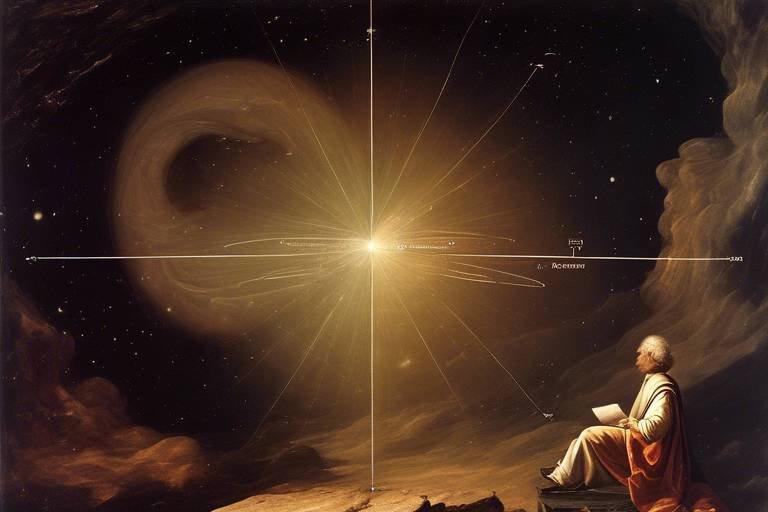Decoding the Metaphysics of Determinism
The concept of determinism has intrigued philosophers, scientists, and thinkers for centuries. At its core, determinism suggests that every event, including human actions, is the outcome of preceding events governed by the laws of nature. This notion can feel a bit like being a puppet on a string, where every move is dictated by a series of causes and effects that stretch back through time. But what does this mean for our understanding of free will? Are we simply following a script written by the universe, or do we have the power to change our fate?
To understand determinism, we must dive into its historical roots. The idea can be traced back to ancient philosophies, but it gained significant traction during the Enlightenment with thinkers like Baruch Spinoza and David Hume. They posited that everything in the universe, from the falling of an apple to the choices we make, can be explained through a chain of prior events. Imagine a vast, intricate machine where every gear turns in perfect harmony; this is the deterministic universe as envisioned by its proponents.
However, the implications of determinism extend beyond mere philosophical musings. They challenge our understanding of moral responsibility. If our actions are preordained, can we truly be held accountable for them? This question lies at the heart of many debates in ethics and law, prompting us to reconsider how we view justice and culpability. In a world where every decision is a product of prior causes, the very foundation of personal responsibility may be shaken.
As we navigate the waters of determinism, it’s essential to recognize that this concept is not monolithic. There are various philosophical perspectives that attempt to reconcile determinism with the notion of free will. Some argue that the two can coexist, while others vehemently oppose this idea. This ongoing discourse is akin to a lively debate in a crowded café, with each voice bringing its unique flavor to the table.
In summary, the metaphysics of determinism is a complex tapestry woven from threads of history, philosophy, and ethics. It invites us to question the very essence of our existence and the nature of our choices. As we delve deeper into this topic, we will explore the perspectives of compatibilism and incompatibilism, the scientific implications, and how modern discoveries in physics and neuroscience challenge traditional notions of free will. So, buckle up as we embark on this philosophical journey!
- What is determinism? Determinism is the philosophical concept that all events, including human actions, are determined by preceding events in accordance with natural laws.
- Can free will exist in a deterministic universe? This is a contentious issue among philosophers, with compatibilists arguing that free will and determinism can coexist, while incompatibilists believe they cannot.
- How does neuroscience relate to determinism? Neuroscience suggests that brain activity may precede conscious decisions, raising questions about the extent of free will.
- What role does quantum mechanics play in this debate? Quantum mechanics introduces indeterminacy at the atomic level, leading some to argue that this could allow for genuine free will.

Understanding Determinism
Determinism is a philosophical concept that suggests every event, including human actions, is the outcome of preceding events in accordance with natural laws. Imagine a giant cosmic domino effect where each piece falls precisely because the one before it did. This idea has deep historical roots, tracing back to ancient philosophies and evolving through the ages as thinkers grappled with the implications of a predetermined universe. At its core, determinism posits that everything is interconnected, and the universe operates like a well-oiled machine, where every action is an inevitable result of prior conditions.
To truly grasp determinism, one must consider its implications on free will. If our choices are merely the product of past events and natural laws, can we genuinely claim to act freely? This question has sparked endless debates among philosophers, scientists, and theologians alike. The notion that our lives are scripted by a series of causative factors challenges our understanding of moral responsibility. If we are not the authors of our actions, how can we be held accountable for them?
Historically, determinism has been associated with the works of prominent figures such as Baruch Spinoza and David Hume. Spinoza argued that everything in the universe, including human thoughts and actions, is part of a single, unified substance governed by deterministic laws. Hume, on the other hand, introduced a nuanced view that allowed for a form of free will within a deterministic framework, which we will explore in greater detail under the compatibilism section. This interplay between determinism and free will sets the stage for a rich tapestry of philosophical inquiry.
In modern times, determinism has taken on new dimensions with advancements in science, particularly in the fields of physics and neuroscience. The deterministic view of the universe aligns with classical mechanics, where every particle’s movement can be predicted if its initial conditions are known. However, the advent of quantum mechanics has thrown a wrench into this neatly ordered perspective, suggesting that at the subatomic level, events may not be strictly determined. This raises intriguing questions: Does quantum indeterminacy imply that free will exists, or does it simply highlight our ignorance of the underlying mechanisms?
In summary, understanding determinism involves delving into its historical roots, philosophical implications, and its ongoing relevance in contemporary scientific discourse. It invites us to confront challenging questions about the nature of our existence and whether we are truly the captains of our fate or merely passengers on an inevitable journey. As we continue to explore this fascinating concept, we will uncover the various philosophical perspectives that have emerged, each offering unique insights into the relationship between free will and determinism.

Philosophical Perspectives
The debate surrounding determinism is as intricate as a spider's web, with various philosophical perspectives weaving in and out of each other, creating a rich tapestry of thought. At the core of this discussion are three primary viewpoints: compatibilism, incompatibilism, and libertarianism. Each of these perspectives offers a unique lens through which to examine the relationship between free will and determinism, often leading to more questions than answers. It's like trying to solve a puzzle where some pieces seem to fit while others just don't make sense. So, let’s unpack these ideas and see how they shape our understanding of human agency.
Compatibilism is the idea that free will and determinism can coexist harmoniously. Think of it as a dance between fate and choice, where both partners have their roles but still manage to create a beautiful performance together. Compatibilists argue that even if our actions are determined by prior events, we can still act freely as long as we are not coerced. This perspective allows for a more nuanced understanding of human agency, suggesting that we can be held morally responsible for our actions, even in a deterministic framework. It’s like saying that while the game is rigged, how we play it still matters.
On the other hand, we have incompatibilism, which takes a firmer stance, claiming that if determinism is true, then free will cannot exist. Incompatibilists argue that true freedom requires the ability to have acted differently in any given situation. If our choices are predetermined, then how can we be genuinely responsible for them? This perspective raises profound questions about morality and accountability. Imagine a scenario where a person commits a crime; if their actions were predetermined by a chain of events beyond their control, can we truly hold them accountable? This is the crux of the incompatibilist argument, and it challenges us to rethink our notions of justice and responsibility.
Lastly, there’s libertarianism, which posits that we do have free will and that our choices are not determined by prior events. Libertarians argue that individuals possess the ability to make genuine choices that are not constrained by external factors. This perspective embraces the idea of human agency in its fullest form, suggesting that we are the architects of our own destinies. However, this view also raises questions about how we reconcile our sense of freedom with the scientific understanding of causality and the laws of nature.
To summarize the key philosophical perspectives on determinism, consider the following table:
| Perspective | Definition | Implications |
|---|---|---|
| Compatibilism | Free will and determinism coexist | Moral responsibility is maintained |
| Incompatibilism | Free will cannot exist if determinism is true | Challenges notions of moral accountability |
| Libertarianism | Individuals have genuine free will | Emphasizes personal agency and responsibility |
As we navigate through these philosophical waters, it's essential to recognize that each perspective offers valuable insights. The interplay between free will and determinism is not just an abstract philosophical debate; it has real-world implications for how we understand ourselves, our choices, and our responsibilities. In a world that often feels chaotic and unpredictable, grappling with these concepts can provide clarity and a deeper appreciation for the complexities of human life.
- What is determinism? Determinism is the philosophical concept that all events, including human actions, are determined by preceding events in accordance with the natural laws.
- Can free will exist in a deterministic universe? This is a central question in the debate, with compatibilists arguing that free will and determinism can coexist, while incompatibilists believe they cannot.
- What are the implications of determinism for moral responsibility? Determinism raises important questions about accountability and moral responsibility, particularly in cases where actions are seen as predetermined.

Compatibilism
When it comes to the intricate dance between free will and determinism, steps in as a fascinating partner. This philosophical viewpoint argues that free will and determinism are not enemies but rather can coexist harmoniously. Imagine a river flowing steadily; the water's path is determined by the landscape, yet within that flow, fish swim freely, choosing their direction. This metaphor beautifully illustrates how compatibilists view human agency within a deterministic framework.
At its core, compatibilism suggests that even if our actions are influenced by prior events and natural laws, we still possess the ability to make choices. Think of it as being in a video game where the storyline is predetermined, but you still get to choose how your character interacts with the environment. This perspective enables a redefinition of free will: instead of being an absolute freedom from causation, it becomes about acting in accordance with one's desires and intentions, even if those desires are shaped by previous experiences.
Key proponents of compatibilism, such as David Hume and Daniel Dennett, have contributed significantly to this discourse. Hume argued that liberty is simply the ability to act according to one's will, while Dennett emphasizes that understanding the mechanisms behind our choices does not negate their authenticity. They contend that recognizing the influences on our decisions can actually enhance our sense of responsibility rather than diminish it.
However, compatibilism isn't without its critics. Incompatibilists challenge the notion that true free will can exist in a deterministic universe. They argue that if every action is a result of prior causes, then our choices are merely illusions. This critique raises important questions about moral responsibility: if our actions are predetermined, can we truly be held accountable for them? The debate continues, with compatibilists asserting that acknowledging determinism enriches our understanding of human behavior and ethics.
In summary, compatibilism offers a compelling perspective that seeks to bridge the gap between determinism and free will. By redefining free will as the ability to act according to one's desires—shaped though they may be by past events—compatibilists provide a nuanced understanding of human agency that resonates with our everyday experiences. As we navigate through life, we often find ourselves weighing choices, and compatibilism invites us to embrace the complexity of those decisions within the deterministic framework of the universe.
- What is compatibilism? Compatibilism is the philosophical view that free will and determinism can coexist, suggesting that individuals can still make choices even if those choices are influenced by prior events.
- Who are the main philosophers behind compatibilism? Key figures include David Hume and Daniel Dennett, who argue that understanding the influences on our decisions does not negate their authenticity.
- What are the critiques of compatibilism? Critics, particularly incompatibilists, argue that if all actions are predetermined, true free will cannot exist, raising questions about moral responsibility.

Key Proponents
When we delve into the realm of compatibilism, we encounter some fascinating thinkers who have shaped this perspective significantly. Among them, David Hume stands out as a pivotal figure. Hume argued that our understanding of free will is not about the ability to act independently of deterministic forces but rather about the capacity to act according to our desires and motivations. He believed that if our actions stem from our internal states, then we can still be considered free, even in a deterministic universe. This notion suggests that freedom is less about absolute independence and more about being in control of our own choices within the framework of causation.
Another key proponent of compatibilism is Daniel Dennett. Dennett takes Hume's ideas further by suggesting that our understanding of free will should be rooted in the complexity of human cognition. He posits that our ability to reflect on our choices and consider various options is what grants us a sense of agency. In his view, free will is not about escaping causality but rather about navigating it effectively. Dennett emphasizes that acknowledging the deterministic nature of the universe does not strip away our autonomy; instead, it enriches our understanding of how we make decisions.
Both Hume and Dennett challenge the traditional dichotomy between free will and determinism. They propose that by redefining free will in a way that accommodates determinism, we can maintain a sense of moral responsibility. This is crucial because if we accept that our actions are influenced by prior events, we must also grapple with the implications for accountability. Compatibilists argue that understanding the causes behind our actions can enhance our moral framework rather than undermine it.
However, it's essential to recognize that not everyone agrees with this perspective. Critics of compatibilism argue that if determinism is true, then our choices are merely the result of preceding events and conditions, stripping away genuine agency. This ongoing debate highlights the rich complexity of the discussion surrounding free will and determinism. As we explore these philosophical waters, we must consider the implications of each viewpoint and how they shape our understanding of human behavior and moral responsibility.
- What is compatibilism? Compatibilism is the philosophical view that free will and determinism are not mutually exclusive and can coexist.
- Who are the key proponents of compatibilism? Major proponents include David Hume and Daniel Dennett, who argue that human agency can exist within a deterministic framework.
- What are the critiques against compatibilism? Critics argue that if determinism is true, then true free will cannot exist, raising concerns about moral responsibility.
- How does compatibilism affect our understanding of moral responsibility? Compatibilists believe that understanding the causes of our actions can enhance our moral accountability rather than diminish it.

Critiques of Compatibilism
Compatibilism, while offering a fascinating reconciliation between free will and determinism, is not without its critics. Many philosophers argue that this perspective ultimately misses the mark when it comes to understanding the true nature of human freedom. One of the primary critiques centers around the notion that compatibilism merely redefines free will in a way that strips it of its traditional meaning. Critics contend that if our choices are predetermined by prior events and natural laws, then the very essence of free will—that is, the ability to choose otherwise in any given situation—becomes an illusion.
Incompatibilists, for instance, argue that compatibilism fails to address the fundamental question of moral responsibility. If every action we take is the result of a chain of events beyond our control, how can we hold individuals accountable for their actions? This leads to a paradox: on one hand, compatibilists assert that we can still be morally responsible, but on the other hand, they acknowledge that our choices are not truly free. This contradiction raises eyebrows and invites further scrutiny.
Moreover, some critics highlight the emotional and psychological implications of compatibilism. If we accept that our actions are predetermined, it might lead to a sense of fatalism or resignation. People may feel less motivated to make positive changes in their lives if they believe their outcomes are already set in stone. This perspective could foster a passive attitude, undermining the very concept of personal growth and agency that compatibilists aim to preserve.
To illustrate the critiques of compatibilism, let's consider a few key arguments:
- Redefinition of Free Will: Critics argue that compatibilism redefines free will in a way that dilutes its significance.
- Moral Responsibility: If all actions are predetermined, can we truly hold individuals accountable?
- Psychological Impact: A deterministic view may lead to fatalism, reducing motivation for change.
In summary, while compatibilism attempts to bridge the gap between determinism and free will, it opens the door to significant critiques that challenge its validity. These critiques not only question the conceptual integrity of compatibilism but also highlight the broader implications for moral responsibility and human agency. As the debate continues, it becomes increasingly evident that understanding determinism and free will is a complex endeavor, one that requires careful consideration of various philosophical perspectives.
- What is compatibilism? Compatibilism is the philosophical view that free will and determinism are not mutually exclusive and can coexist.
- What are the main critiques of compatibilism? Critics argue that it redefines free will, undermines moral responsibility, and may lead to a fatalistic mindset.
- How does compatibilism differ from incompatibilism? Incompatibilism holds that free will and determinism cannot coexist, whereas compatibilism argues that they can.

Incompatibilism
Incompatibilism is a philosophical stance that boldly asserts free will and determinism are fundamentally incompatible. Imagine a world where every action we take is already scripted; the idea can be unsettling. Incompatibilists argue that if our choices are predetermined by prior events or natural laws, then the concept of free will becomes an illusion. This perspective creates a fascinating yet complex dialogue about moral responsibility and human agency.
The implications of incompatibilism are profound. If we are not truly free to make choices, can we be held accountable for our actions? This question strikes at the heart of ethics and justice, as it challenges the very foundation of how we perceive morality. For instance, if a person commits a crime, should they be punished if their actions were determined by factors beyond their control? Incompatibilists would argue that without genuine free will, the notion of moral responsibility loses its meaning.
To illustrate this viewpoint, consider the following example: Imagine you're driving a car on a predetermined path, guided by a GPS. No matter how much you wish to take a different route, the GPS dictates your journey. In this scenario, your choices are limited, and the freedom to explore alternative paths is nonexistent. This analogy encapsulates the incompatibilist perspective, emphasizing that true freedom requires the ability to choose among genuine alternatives.
Incompatibilism can be further categorized into two main branches: hard incompatibilism and soft incompatibilism. Hard incompatibilists reject the very existence of free will in any form, while soft incompatibilists acknowledge that some aspects of free will may exist but argue that they cannot coexist with determinism. This distinction is crucial in understanding the spectrum of thought within incompatibilism.
Moreover, incompatibilism raises critical questions about the nature of human experience and the essence of consciousness. If we are mere products of our environment and biology, what does that say about our individuality? Are we simply puppets dancing to the strings of fate? These inquiries invite deeper reflection on the human condition and our place in the universe.
In summary, incompatibilism presents a compelling argument against the coexistence of free will and determinism. It challenges us to rethink our understanding of agency, responsibility, and the very nature of our choices. As we navigate this philosophical landscape, the questions raised by incompatibilism encourage us to explore the intricacies of our existence, ultimately leading to a richer understanding of what it means to be human.
- What is incompatibilism? Incompatibilism is the belief that free will and determinism cannot coexist. If our actions are predetermined, true free will does not exist.
- What are the implications of incompatibilism? Incompatibilism raises significant questions about moral responsibility. If our actions are not truly free, can we be held accountable for them?
- How does incompatibilism differ from compatibilism? Compatibilism argues that free will and determinism can coexist, while incompatibilism maintains that they are fundamentally at odds with one another.
- What are the two branches of incompatibilism? The two branches are hard incompatibilism, which denies any form of free will, and soft incompatibilism, which allows for some aspects of free will but argues they cannot coexist with determinism.

Scientific Implications
When we dive into the of determinism, we find ourselves at a fascinating crossroads where philosophy meets hard science. This intersection is not just an academic exercise; it has profound implications for how we understand human behavior, consciousness, and even our sense of moral responsibility. As we peel back the layers, we uncover how modern discoveries in physics and neuroscience challenge our traditional notions of free will and agency.
At the forefront of this exploration is quantum mechanics, a field that has revolutionized our understanding of the universe. Unlike classical physics, which operates under deterministic principles, quantum mechanics introduces a level of indeterminacy that raises questions about predictability. Imagine flipping a coin; while you can predict it will land on heads or tails, you cannot determine the outcome until it actually falls. This randomness at the quantum level has led some to speculate that it might allow for a form of free will. Could it be that our choices are influenced by quantum fluctuations? This tantalizing possibility adds a layer of complexity to the determinism debate.
In addition to quantum mechanics, the field of neuroscience has provided compelling insights into the workings of the human brain. Recent studies suggest that our decisions may be less about conscious choice and more about predetermined brain activity. For instance, experiments have shown that brain activity can predict a person's decision several seconds before they consciously make it. This raises a critical question: if our brains are firing off signals that dictate our choices before we are even aware of them, what does this mean for our understanding of free will? Are we merely passengers in our own bodies, with our choices already written in the neural pathways of our brains?
To better illustrate these scientific implications, consider the following table that summarizes key findings from neuroscience research:
| Study | Findings | Implications |
|---|---|---|
| Libet's Experiment | Brain activity precedes conscious decision-making | Challenges the notion of free will |
| Haynes et al. (2007) | Predicting decisions from brain scans | Questions the role of consciousness in decision-making |
| Soon et al. (2008) | Decisions can be predicted up to 10 seconds in advance | Suggests a deterministic framework for human choices |
This data not only fuels the debate on determinism versus free will but also prompts us to reconsider our understanding of moral responsibility. If our actions are determined by a combination of quantum events and neural processes, can we truly hold individuals accountable for their choices? The implications are staggering and invite further investigation into the nature of consciousness itself.
In conclusion, the scientific implications of determinism are profound and multifaceted. As we continue to unravel the mysteries of the brain and the universe, we must grapple with the unsettling yet intriguing possibility that our sense of free will may be an illusion. This journey into the depths of human agency is not just a philosophical inquiry; it's a quest that touches on the very essence of what it means to be human.
- What is determinism? Determinism is the philosophical idea that every event, including human actions, is determined by preceding events in accordance with the natural laws.
- How does quantum mechanics relate to free will? Quantum mechanics introduces randomness at the subatomic level, which some argue could allow for genuine free will, challenging deterministic views.
- What do neuroscientific studies suggest about free will? Neuroscience suggests that our decisions may be predetermined by brain activity, raising questions about the extent of our conscious control over choices.
- Can determinism coexist with moral responsibility? This is a contentious issue; if our actions are determined, it complicates the traditional notions of accountability and moral responsibility.

Quantum Mechanics
When we dive into the realm of , we enter a universe that defies our everyday understanding of reality. Imagine a world where particles can exist in multiple states at once, only to settle into one when observed. This peculiar behavior raises profound questions about determinism and free will. In classical physics, the universe is like a well-oiled machine, where every gear turns predictably based on prior movements. However, quantum mechanics introduces an element of indeterminacy that shakes this foundation to its core.
At the quantum level, events do not follow the deterministic path we might expect. Instead, they seem to be governed by probabilities. This leads to the intriguing question: if the fundamental building blocks of our universe are not strictly determined, what does this imply for our own sense of agency? Some argue that this indeterminacy might open the door for genuine free will, suggesting that if the universe is not entirely predictable, perhaps our choices are not entirely predetermined either.
To illustrate this concept, let’s consider the famous double-slit experiment. In this experiment, particles such as electrons are fired at a barrier with two slits. When unobserved, they behave like waves, creating an interference pattern that suggests they pass through both slits simultaneously. However, once we observe which slit a particle goes through, it behaves like a particle, and the interference pattern disappears. This phenomenon raises the question: does our observation influence the outcome? If so, could it be that our consciousness plays a role in shaping reality?
Furthermore, the implications of quantum mechanics stretch beyond just physics. They touch on the philosophical debates surrounding free will and determinism. If the subatomic world is inherently unpredictable, one might argue that this unpredictability could seep into our decision-making processes, allowing for a form of free will that is not strictly constrained by deterministic laws. However, this view is not without its critics. Some philosophers caution against conflating quantum indeterminacy with genuine freedom, arguing that randomness does not equate to agency.
In summary, the intersection of quantum mechanics and the debate on determinism is a fascinating, albeit complex, landscape. It challenges our fundamental beliefs about causality and the nature of existence. As we continue to explore this enigmatic field, we might find ourselves grappling with more questions than answers. What if our understanding of free will is as fluid as the particles that make up our universe? What implications would that have for our sense of self and moral accountability?
- What is quantum mechanics? Quantum mechanics is a fundamental theory in physics that describes the physical properties of nature at the scale of atoms and subatomic particles.
- How does quantum mechanics relate to determinism? Quantum mechanics introduces elements of indeterminacy, suggesting that not all events are predetermined, which raises questions about free will.
- What is the double-slit experiment? The double-slit experiment demonstrates that particles can display characteristics of both waves and particles, depending on whether they are observed.
- Can quantum mechanics provide evidence for free will? Some interpretations of quantum mechanics suggest that indeterminacy at the quantum level could allow for a form of free will, though this is a contentious point among philosophers.

Neuroscience and Free Will
When we delve into the intricate relationship between neuroscience and free will, we find ourselves navigating a maze of fascinating discoveries and unsettling questions. For decades, scientists have been probing the depths of the human brain, seeking to understand how our thoughts, decisions, and actions arise. What if I told you that some of the latest research suggests that our choices may not be as free as we once believed? This notion can feel like a punch to the gut, especially when you consider the implications it has for our understanding of consciousness and moral responsibility.
One of the most compelling studies in this field was conducted by neuroscientists Benjamin Libet in the 1980s. Libet's experiments revealed that brain activity related to decision-making occurs several hundred milliseconds before a person becomes consciously aware of their intention to act. In other words, the brain seems to "decide" before we even realize we're making a choice! This raises a tantalizing question: if our brains are firing off signals before we consciously decide to act, do we truly have free will, or are we simply observers of our own actions?
To further complicate matters, modern neuroscience has revealed a wealth of information about the brain's inner workings. For instance, functional magnetic resonance imaging (fMRI) studies have shown that specific areas of the brain light up in response to various stimuli, often indicating a predisposed reaction to certain situations. This suggests that our brains are wired in ways that can influence our decisions, potentially steering us towards certain outcomes without our explicit consent.
As we explore these findings, it becomes essential to consider the implications for our understanding of free will. Are we merely puppets, dancing to the strings of our neural pathways? Or is there room for genuine agency within the deterministic framework of brain activity? Some neuroscientists argue that while our brains may set the stage for our choices, the conscious mind still plays a crucial role in evaluating options and making decisions. This perspective aligns with the compatibilist view, suggesting that free will and determinism can coexist, albeit in a complex dance.
However, the debate doesn't end there. Critics of the neuroscience perspective argue that if our decisions are predetermined by neural processes, then the very notion of moral responsibility comes into question. If we are not the architects of our actions, can we truly be held accountable for them? This dilemma has led to a surge in discussions about ethics in a world where free will is under scrutiny. To illustrate the complexity of this issue, consider the following table that summarizes key findings in neuroscience related to free will:
| Study | Findings | Implications |
|---|---|---|
| Libet's Experiment | Brain activity precedes conscious decision-making | Challenges traditional notions of free will |
| fMRI Studies | Specific brain regions activate in response to stimuli | Suggests predetermination of decisions |
| Neuroscience of Morality | Brain activity influences moral judgments | Raises questions about moral responsibility |
As we continue to unravel the complexities of the human brain, the interplay between neuroscience and free will remains a hotbed of discussion and debate. Are we merely products of our biological makeup, or do we possess the ability to transcend our neural wiring? This question invites us to ponder the essence of what it means to be human, igniting a flame of curiosity that may never be fully extinguished. Ultimately, the exploration of neuroscience and free will is not just an academic exercise; it is a journey into the very heart of our existence, challenging us to reconsider the nature of our choices and the essence of our being.
- What is the main argument against free will in neuroscience?
Many neuroscientists argue that if brain activity determines our actions before we are consciously aware of them, then true free will does not exist. - Can free will and determinism coexist?
Compatibilists believe that free will can exist within a deterministic framework, suggesting that we can still exercise agency even if our decisions are influenced by prior events. - What role does consciousness play in decision-making?
While some argue that consciousness is merely an observer of predetermined actions, others maintain that it plays a critical role in evaluating options and making choices.
Frequently Asked Questions
- What is determinism?
Determinism is the philosophical concept that all events, including human actions, are determined by preceding events in accordance with natural laws. It suggests that every decision we make is influenced by prior circumstances and conditions, leaving little room for genuine free will.
- How does determinism relate to free will?
The relationship between determinism and free will is a hotly debated topic. Some argue that if our actions are predetermined, then we cannot be truly free. Others, like compatibilists, believe that free will can coexist with determinism, suggesting that freedom is about acting according to one's desires, even if those desires are influenced by prior events.
- What are the main philosophical perspectives on determinism?
There are several key perspectives on determinism, including:
- Compatibilism: The belief that free will and determinism can coexist.
- Incompatibilism: The view that free will and determinism cannot both be true.
- Libertarianism: The stance that humans have free will and that our choices are not predetermined.
- Who are some key proponents of compatibilism?
Notable philosophers advocating for compatibilism include David Hume and Daniel Dennett. They argue that our understanding of free will can be redefined within a deterministic framework, allowing for moral responsibility even in a predetermined universe.
- What critiques exist against compatibilism?
Critics of compatibilism, particularly incompatibilists, argue that if determinism is true, then true free will cannot exist. They contend that moral responsibility requires the ability to have acted differently, which determinism seems to negate.
- How does modern science intersect with determinism?
Modern science, particularly in fields like physics and neuroscience, has introduced new questions into the determinism debate. Discoveries in quantum mechanics suggest that indeterminacy at the quantum level might allow for some form of free will, while neuroscience raises concerns that our choices could be predetermined by brain activity.
- Can quantum mechanics influence the determinism debate?
Yes, quantum mechanics plays a crucial role in the determinism discussion. The inherent unpredictability at the quantum level raises the possibility that not all events are strictly determined, potentially opening the door for genuine free will.
- What does neuroscience say about free will?
Neuroscience has produced findings suggesting that our decisions may be influenced by brain activity before we consciously make a choice. This raises profound questions about the nature of consciousness and whether our sense of free will is merely an illusion.



















